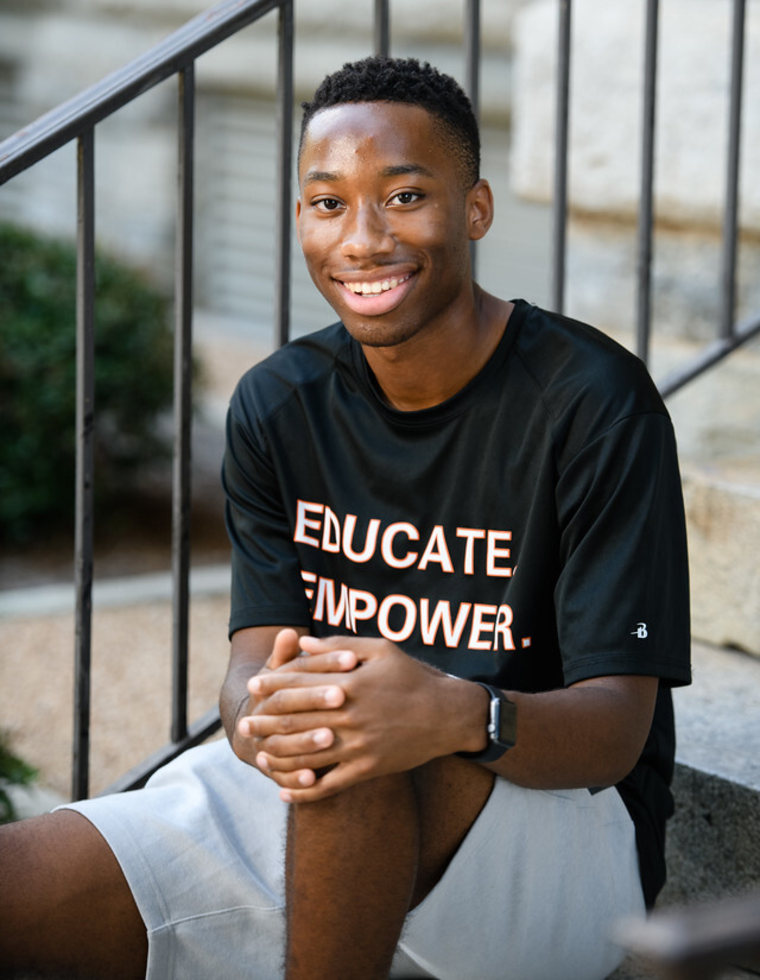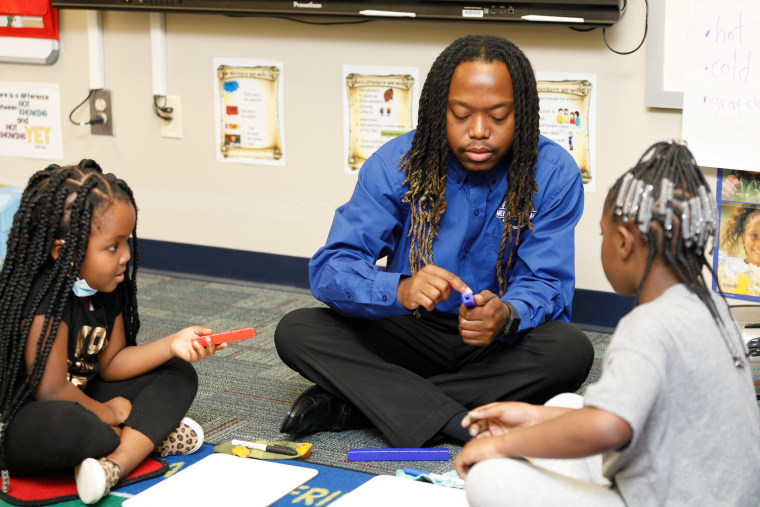[ad_1]
Ashley Reeves, an Indiana school teacher, dreamed of getting her teaching license but could not afford the high price of certification. She settled for a renewable teaching permit, which allows educators to work for one year, to teach at George and Veronica Phalen Leadership Academy, a kindergarten through eighth grade school in Indianapolis. However, Reeves’ aspirations were revitalized when she saw a flier for the Educate ME Foundation, an organization focused on helping Black people become teachers.
Reeves said she joined the program in August and got one-on-one support for test preparation and financial help to cover the costs of certification tests. Reeves received her license in November and returned to the classroom a certified teacher.
“It was like a relief. It was a blessing. It’s always been one of my goals,” Reeves, 31, said. “I’ve been in education for quite some time; it’s been six years. The program itself is just great for first-time teachers or teachers who’ve been in education for a long time.”
Blake Nathan launched the Educate ME Foundation in 2014 in Indianapolis to recruit and retain more Black teachers. Today, the foundation works to mentor and support high school and college students looking to pursue careers in education. It teaches Black students about the value of becoming teachers and helps existing teachers through training and certification programs. Reeves is one of dozens of Black people who have used the foundation’s programs to reach their career goals. Nathan said the work they do ultimately benefits students.
“If you are being educated by a same-race teacher, academically, emotionally, you perform better in the classroom,” Nathan said. “Having a Black teacher in the school building decreases school discipline rates. And if you can decrease school discipline rates, you can decrease the school-to-prison pipeline.”
Before Covid changed the education landscape, Black students were already at a disadvantage due to the dismal number of Black teachers in the classroom and other effects of systemic racism. Black people represented just 7% of teachers in the 2017-18 school year, with white teachers making up 79% of the field, according to the most recent data from the National Center for Education Statistics. This is a dire situation as research shows that when Black students have teachers who look like them, they’re less likely to be over-disciplined and more likely to finish high school and consider college. Therefore, experts say, hiring Black teachers is necessary to address the racial disparities that lead to poor educational outcomes and criminalization for Black children.
But there are many barriers to Black people entering the teaching field. Costly certification tests and exams, called Praxis tests, are a major roadblock for Black teachers trying to become certified, as Black people are more likely than whites to fail these tests, according to a Chalkbeat report. Meanwhile, for Black people who are able to enter the profession, failing these tests can get them booted from their teaching jobs.
Critics believe that these tests, first implemented decades ago, simply work to exclude Black teachers and don’t adequately measure a person’s teaching ability. And there’s little evidence that these tests predict teacher effectiveness at all. And research has shown that, in some cases, Black students perform better academically with a Black teacher who failed the Praxis exam than with a white teacher who passed.
Furthermore, advocates say that Black students who don’t have Black teachers are less likely to become teachers themselves, so commitments to diversifying the industry must start early on in the classroom.
The Educate Me Foundation is one of many programs across the country that aim to train and recruit more Black people into the teaching profession. The programs may use different methods, with some focusing on breaking down the field’s financial barriers and others prioritizing the need to remove implicit biases in credentialing processes (or promoting cultural inclusivity in schools). But they all ultimately aim to improve the educational experience for Black children.
Call Me MISTER, a Clemson University development program for Black men to become elementary school teachers, has produced some 367 educators since 2004, said program field coordinator Winston Holton. Participants are required to work at a South Carolina K-12 public school between one and four years after completing the program, which usually lasts four years, Holton said. Students from “socioeconomically disadvantaged and educationally at-risk communities” receive tuition assistance, mentorship and support for navigating the education industry, and help with job placement.

Founder Tom Parks decided to launch the program in 2000 after learning about the troubling incarceration rates and dismal educational opportunities for Black men. Holton joined the program in 2001 and now serves as a mentor to participants like Caleb Brown, a 20-year-old in his third year of the program, who hopes to become a middle school teacher.
“Representation in the classroom is important,” Brown said. “In the sense of the level of relationships and connections I’ve made, getting this experience early on, that wouldn’t have been possible without the help of Call Me MISTER.”
Many of these development and recruitment programs cater to all genders, but some — like Call Me MISTER and Men of CHS Teach, a Charleston, South Carolina, program inspired by Call Me MISTER — focus on producing more Black male teachers. Just 2% of the country’s teachers are Black men.
That startling statistic, advocates say, is why programs offering different pathways to certification are important.
“Minority males face a lot of barriers in their K-12 experience,” said Eric Stallings, who works with Men of CHS Teach to recruit and support teachers. Men of CHS Teach, which prioritizes men of color, is a partnership between the University of South Carolina and the Charleston County School District.
“They may go into business or marketing, but something always tugs at your heart and you say, ‘I’ve always wanted to be a teacher. I just don’t know,’” he said. “Us creating pathways for that to happen has allowed some of them to come back as educators and truly make a difference. I think that speaks a lot about alternative certification.”
Sharif El-Mekki, founder and CEO of the Center for Black Educator Development based in Philadelphia, said the center’s mission is to build a “national Black teacher pipeline” through policy and advocacy efforts, programs, and partnering with school districts, colleges and similar programs across the country. The center works with school districts to facilitate a course for high school students interested in teaching “but from a Black pedagogical framework, as opposed to what students typically get, all-white educational theory,” El-Mekki said.
“If you try to pursue and reform education without having a deep understanding of the racism that exists to create these disparities, you’re never going to achieve what you purport you want to achieve,” he said.

The center also provides training and mentorship programs for high school and college students, professional development for everyone from college professors to administrators, and consultation services for school districts across the country looking to retain Black teachers. Since its founding in 2019, the center has produced at least 30 teachers, who are now educators or in teacher residency programs.
While some groups focus on getting more Black teachers into classrooms, others focus on the cultural inclusivity that they believe is necessary for tearing down implicit bias in schools — whether in the classroom or the administration offices. The Black Teacher Project in Oakland, California, works with Black teachers to “reimagine schools as communities of liberated learning,” the Project’s website reads. The project offers an 18-month fellowship for Black teachers where they explore Black identity, wellness and culturally competent teaching (or “instruction rooted in Blackness,” according to the site). It also teaches educators how to implement restorative practices in their classrooms and invites them to retreats to foster community among Black teachers.
This, advocates say, will have a positive impact on Black students.
“BTP’s vision is that every student will benefit from the diversity, excellence, and leadership of an empowered Black teaching force,” the website states. “Therefore, the Black Teacher Project’s motto is ‘Every child deserves a Black teacher.’”
[ad_2]
Source link
